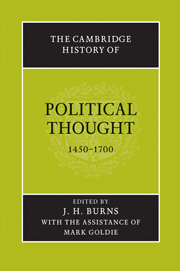Book contents
- Frontmatter
- Introduction
- I Renaissance and Counter-Renaissance
- 1 Humanism and political theory
- 2 Italian political thought, 1450–1530
- 3 Law
- 4 Transalpine humanism
- 5 Scholasticism: survival and revival
- II Religion, civil government, and the debate on constitutions
- III Absolutism and Revolution in the Seventeenth Century
- IV The end of Aristotelianism
- V Natural law and utility
- Conclusion
- Biographies
- Bibliography
- Index of names of persons
- Index of subjects
- References
3 - Law
from I - Renaissance and Counter-Renaissance
Published online by Cambridge University Press: 28 March 2008
- Frontmatter
- Introduction
- I Renaissance and Counter-Renaissance
- 1 Humanism and political theory
- 2 Italian political thought, 1450–1530
- 3 Law
- 4 Transalpine humanism
- 5 Scholasticism: survival and revival
- II Religion, civil government, and the debate on constitutions
- III Absolutism and Revolution in the Seventeenth Century
- IV The end of Aristotelianism
- V Natural law and utility
- Conclusion
- Biographies
- Bibliography
- Index of names of persons
- Index of subjects
- References
Summary
‘Civil science is the true philosophy’, declared the fifteenth-century jurist Claude de Seyssel in his commentary on the Digest, ‘and is to be preferred to all other fields because of its purpose’ (Seyssel 1508, fo.1). Down at least to the eighteenth century this conviction was maintained by professional lawyers of various political persuasions, and indeed expanded because of the increasing interaction between jurisprudence and modern political thought and institutions. The original Roman formula, enshrined in the first lines of that great anthology of classical jurisprudence, the Digest of Justinian, was joined to a deep reverence for judicial expertise and for the holy office of the ‘priests of the laws’; but in its Byzantine context legal science was subordinated to, and conscripted by, the absolutist and imperialist designs of the emperor; and this strategy was resumed by early modern European jurists, especially those serving monarchs – kings of France, Spain, and England – who claimed to be ‘emperors’ in their own kingdoms. Civil law continued to be concerned predominantly with private matters (personal status, family, succession, property, obligations, and the like), though increasingly it came to be subordinated to and shaped by legislation. ‘True philosophy’ was in many ways boud to modern ideas of rulership. This is why political thought in its widest sense cannot be understood apart from law and jurisprudence.
The old legal heritage
In the fifteenth century the European legal tradition was vastly complex but displays, from a modern perspective, three fairly distinctive aspects, corresponding to civil, canon, and customary law. By then each o f these had been formulated in modern written terms, rationalised and in various ways modernised, and subjected to several generations of adaptive 'interpretation'.
- Type
- Chapter
- Information
- The Cambridge History of Political Thought 1450–1700 , pp. 66 - 94Publisher: Cambridge University PressPrint publication year: 1991
References
- 1
- Cited by

